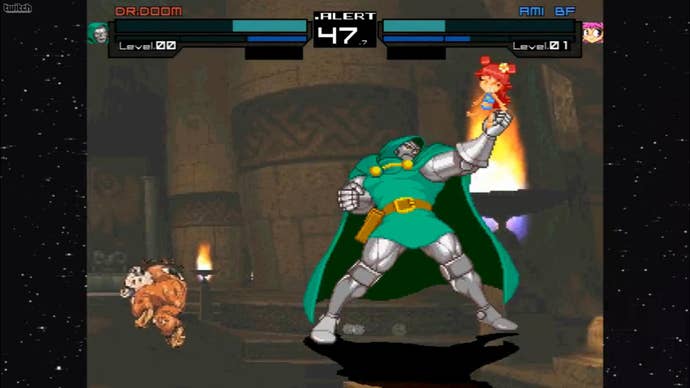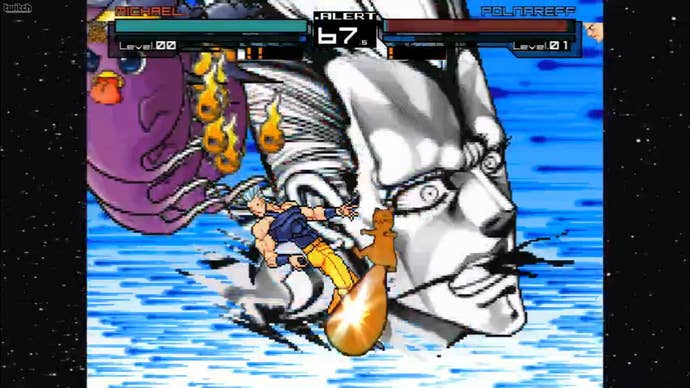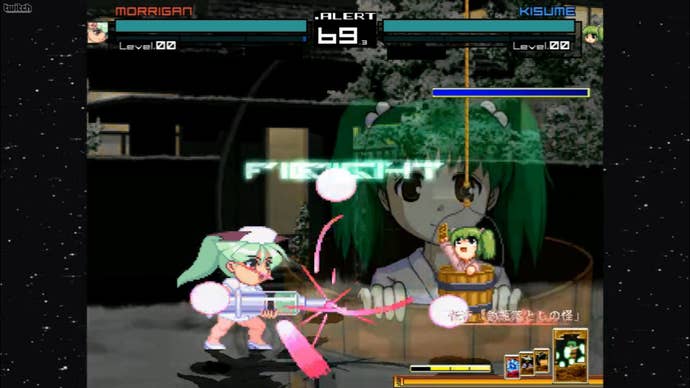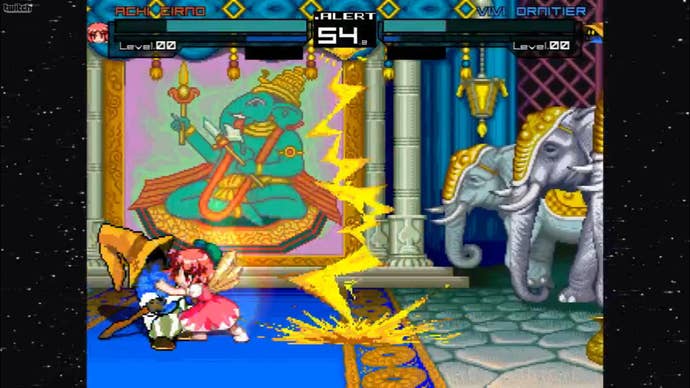Twitch-Based: Exploring the Salty Bet Phenomenon
Eurogamer's Rich McCormick earns his salt in the bewildering fighting game casino.
This article first appeared on USgamer, a partner publication of VG247. Some content, such as this article, has been migrated to VG247 for posterity after USgamer's closure - but it has not been edited or further vetted by the VG247 team.
I dreamed about Salty Bet two weeks ago. I've only ever dreamed about one other game in my life. That was Ocarina of Time, and I was 12.
When I woke up, I turned on my computer, went to saltybet.com, and watched a small anime cat girl beat up a baby in a mech suit. Minutes later, I'd completed a payment of just under nine dollars for three months' membership. When I logged back into my account, I bet a substantial amount of pretend money on a green-haired, Japanese-speaking version of Ronald McDonald who'd scream "ran ran RUUU!" as he chucked fistfuls of fries at his opponent.
I do not regret spending those nine dollars.
Salty
1. To be upset, annoyed, or irritated, often as the result of being made to look a fool. Used regularly by the fighting game community (FGC).

Salty Bet is a game about a game. It pits computer-controlled fighting game fighters against other computer-controlled fighting game fighters on a nearly non-stop loop. As is tradition with beat 'em ups, the fighters come from all corners of the earth. There's Ryu and Ken from Street Fighter, Mai Shiranui from King of Fighters, and Spiderman from Marvel vs. Capcom 2. But there's also the aforementioned baby in a mech suit. There's a killer whale. There's a man-sized version of the open-mouthed subject from Edvard Munch's expressionist painting the Scream, appropriately named 'Munch.'
They're able to fight each other thanks to the magic of MUGEN: a free fighting game engine that allows people to plug in their favourite characters. Ken and Ryu have had their data and move-set cribbed straight from Street Fighter. Munch is a community-made character born from 2chan's desire to replicate Japanese memes in a fighting game environment. In between are all manner of oddities: existing fighting game characters with vastly increased damage, bafflingly powerful schoolgirls, and -- for some reason -- a small army of Dragon Ball Z characters, each with a varying suffix.
These characters are randomly drawn to battle each other. Their matches are watched, discussed, and ultimately bet on by -- on an average day -- between one and five thousand people at a time. Bets aren't made with real money: the only currency at stake is 'Salty bucks.' They're completely arbitrary and completely inconsequential, and I paid about nine bucks to make sure that I never ran out of them.
My nine bucks got me three months of 'Illuminati' status, allowing me to see the career wins and losses of the site's slate of MUGEN fighters. Salty Bet pays out on bets depending on the match odds, in turn generated by those who bet. If Rare Akuma (won 32, lost two), taken from the Street Fighter series and souped up to ludicrous levels by MUGEN character creator P.o.t.S., steps onto the field against a wobbly pixelated version of soccer player Thierry Henry (won two, lost 33), the odds will skew heavily in Akuma's favour and betters will find scant reward -- a Salty buck or two, at most -- for betting on the favorite. Conversely, bet on the underdog, and you could be sitting on a fortune. Get the call wrong, though -- guess that a seven foot monster with a sword might batter a ten year old girl dressed as a cat, only to have the cat-girl score three perfect rounds in a row -- and you're back to the salt mines.
Salt mines
1. Players who've bet all their money and lost are said to be in the 'salt mines.' They are afforded a handful of Salty bucks with which to re-earn a fortune.

An Illuminati's Salty bank balance never drops below $666 no matter how disastrous their bet, meaning they're always well clear of the dreaded mines. I used this to my advantage when I first joined their ranks, betting my whole pot on clear underdogs in an attempt to win big. Upsets aren't common, but dodgy AI, strangely sized stages, and character mismatches can hand vast payouts to those brave enough to bet.
I won biggest on Captain Caveman. I stuck $887 on the irritating '70s cartoon character, hoping he'd outdo Mortal Kombat's Johnny Cage. Somehow he did: Cage's AI was unable to cope with Caveman's surprisingly effective rushdown game, and I received a $7,461 paycheck. I lost most betting on The Nightmare: $3,133 down the tubes against an anime girl in a nightdress with one previous recorded victory over twenty bouts.
Salty Bet only stops streaming MUGEN matches during real-world fighting game community tournaments. It was at the most prominent of these that the site got its inspiration, as its creator explains.
"I started opening bets for FGC tournaments in May (2013), and continued to be a part of major events up until EVO. After EVO, I started brainstorming and became interested in the idea of streaming MUGEN so that people could bet when FGC events weren't happening. Things started off pretty simple, with me loading up characters manually, pausing the game, and entering in the matches. Things just grew incrementally from there until it became a 24/7 fake money casino."
Salty Bet's creator is protecting their anonymity: when I asked for a name, Salty said the site was "powered by a team of highly intelligent saltwater dolphins," only providing a tidbit of detail on their background. "I played Marvel vs. Capcom casually within my local FGC, but was and still am primarily a stream monster."
Stream monster
1. The denizens of FGC stream chat channels - primarily found on Twitch.tv - known for rapid meme adoption and vitriol.

Salty Bet has attracted stream monsters of its own, with their own exhaustive lexicon of terms. I asked Salty what he thought caused the rampant neologism. "It's a mix. The site itself is called 'Salty' Bet, and salty is like the first or second word in the FGC handbook. The community has many people from outside the FGC as well, so they bring their own influences. Dongers?"
Many words and phrases spotted on Salty Bet's chat are loaned from other Twitch.tv channels, or even other games. Visitors will often see the words "raise your dongers" accompanied by a squat figure with raised arms: "????????." The term originated in League of Legends' player Imaqtpie's stream, and has propagated across Twitch streams, to be deployed at near-random intervals.
But Salty Bet has also birthed its own language. "Mexibeams" are hugely powerful laser attacks, used with regularity by MUGEN's Dragon Ball Z and Saint Seiya characters. Their name comes from the Spanish-speaking versions of the latter group loaded into Salty's casino; their popularity comes from their ability to turn a match in one attack. Often DBZ characters -- over-represented in Salty Bet's roster -- will flounder all game, missing punches and taking a pummelling, before unleashing a mexibeam that wipes an opponent's health bar in a single strike. This has resulted in Salty Bet's first two maxims: "always bet on DBZ," and "never bet on DBZ."
The "mexi" prefix has been tacked on to other words: health, to indicate an inflated hit-point pool, or damage, to suggest the character hits overly hard. It's even sometimes jammed onto the front of another Salty-forged word: "dream." When a character is on course for an upset, the stream chat in the corner of the screen will be awash with dreamers. At first, the stock phrase was "the dream is alive!" Over time, it's morphed to "dream.exe is installing!" When the underdog's upset is stymied, "dream.exe has crashed."
More specific memes are produced as viewers learn Salty's roster. Darkstalkers' Jon Talbain growls before a match: Twitch chat replicates the noise, hundreds of people repeatedly typing "RRRRRRRRR." Others, such as "waifu", to be aimed at any female anime character, are repurposed from internet subculture dens - most commonly 4chan.
My steaks
1. A pseudo-malapropism for "mistakes", a contraction of the phrase "mistakes were made," used when a better has bet on an inferior character.

MUGEN's open-source nature means new characters can be suggested by emailing their data in. That variety breeds Salty Bet's best matches: robots versus children, children versus extra-galactic tentacle creatures, extra-galactic tentacle creatures versus dogs. I asked Salty for his favorite match so far.
"Every Thursday we have a special event where subscribers to the Twitch channel can request exhibition matches. During the Shaker Classic 5 tournament, someone requested Radish SSJ4 vs Barney, both characters capable of one hit KO. About five seconds into the fourth round they both just started feeling the music and jamming unexpectedly, before resuming battle."
Salty is happy to admit new characters, no matter how weird. "As long as the character doesn't crash the game/system, they will probably make at least one appearance. If they end up in the roster and fail to entertain, they may be removed. Some people like to see very balanced characters and match-ups which I understand, but you won't get the fun Radish and Barney dance party moments without a few broken characters."
An hour with Salty Bet is packed with those moments. As I type this, I'm watching Ikkyu versus K' in a small window at the bottom of my screen. K' is from King of Fighters, and wearing a red jacket. Ikkyu is from Japanese arcade exclusive Blood Warrior and appears to be a small Buddha-esque figure stuck in a permanent crotch-thrusting loop. Next up is Guile versus Bison -- an actual bison, large enough to fill half the screen on four legs. Bison wins, crushing Guile with repeat headbutts before the Street Fighter can throw out a sonic boom.
"Mugen" means "dreams" or "fantasy" in Japanese. Not only does MUGEN allow dream matchups -- Ryu versus Link, Homer Simpson versus Spiderman -- but it has enabled a game about a game good enough to dream about. And as an hour with Salty Bet and its unique language will tell you, dreams will never die.
